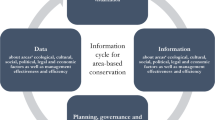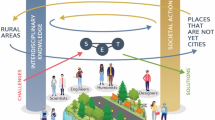Abstract
Context
Novel ecosystems are anthropogenic landscapes that cannot be returned to their original ecological status. Little is known the social-ecological dynamics of these never-before-seen ecosystems. Less is known of their implications for society, sustainability and transitioning.
Objective and methods
This literature review contends that novel ecosystems may be regarded as exemplars of social-ecological resilience and that the exploration of potential opportunities within novel ecosystem theory is being constrained by a lack of investigation.
Results
Societal values in relation to novel ecosystems are unknown. Since societal values can influence conservation and restoration policies and practice, it is suggested that future policy prescriptions will need to explore the fundamentals this emerging relationship.
Conclusions
It could be contended that such complex issues such as novel ecosystems will demand a science of transition, where the desire is to combine the science of discovery and science of engagement into a normative framework for societal change based on reality and realistic objectives and goals.
Similar content being viewed by others
References
Adger WN (2000) Social and ecological resilience: are they related? Prog Hum Geogr 24(3):347–364
Adger WN (2006) Vulnerability. Glob Environ Change 16(3):268–281
Ahern J (2013) Urban landscape sustainability and resilience: the promise and challenges of integrating ecology with urban planning and design. Landscape Ecol 28(6):1203–1212
Aronson J, Alexander S (2013) Ecosystem restoration is now a global priority: time to roll up our sleeves. Restor Ecol 21(3):293–296
Aronson J, Blignaut JN, Milton SJ, Maitre DL, Esler KJ, Limouzin A, Fontaine C, De Wit MP, Mugido W, Prinsloo P, Van Der Elst L, Lederer N (2010) Are socioeconomic benefits of restoration adequately quantified? A meta-analysis of recent papers (2000–2008) in restoration ecology and 12 other scientific journals. Restor Ecol 18(2):143–154
Barr S, Devine-Wright P (2012) Resilient communities: sustainabilities in transition. Local Environ 17(5):525–532
Biermann F (2007) ‘Earth system governance’ as a crosscutting theme of global change research. Glob Environ Change 17(3–4):326–337
Birkmann J, Garschagen M, Kraas F, Quang N (2010) Adaptive urban governance: new challenges for the second generation of urban adaptation strategies to climate change. Sustain Sci 5(2):185–206
Blignaut J, Aronson J, de Groot R (2014) Restoration of natural capital: a key strategy on the path to sustainability. Ecol Eng 65:54–61
Bridgewater P, Higgs ES, Hobbs RJ, Jackson ST (2011) Engaging with novel ecosystems. Front Ecol Environ 9(8):423
Chapin FS III, Starfield AM (1997) Time lags and novel ecosystems in response to transient climatic change in arctic Alaska. Clim Change 35(4):449–461
Chapin FS III, Robards MD, Johnstone JF, Lantz TC, Kokelj SV (2013) Case study: novel socio-ecological systems in the north: potential pathways towards ecological and societal resilience. In: Hobbs RJ, Higgs ES, Hall CM (eds) Novel Ecosystems: Intervening in the New Ecological World Order. Wiley, Oxford, pp 334–349
Choi YD (2007) Restoration ecology to the future: a call for new paradigm. Restor Ecol 15(2):351–353
Clark WC, Dickson NM (2003) Sustainability science: the emerging research program. Proc Natl Acad Sci USA 100(14):8059–8061
Collier MJ (2013) Field boundary stone walls as exemplars of ‘novel’ ecosystems. Landsc Res 38(1):141–150
Collier MJ (2014) Novel ecosystems and the emergence of cultural ecosystem services. Ecosyst Serv 9:166–169
Collier MJ, Scott M (2008) Industrially harvested peatlands and after-use potential: understanding local stakeholder narratives and landscape preferences. Landsc Res 33(4):439–460
Cramer VA, Hobbs RJ (eds) (2007) Old fields: dynamics and restoration of abandoned landscapes. Island Press, Washington
Cumming GS, Olsson P, Chapin FS III, Holling CS (2013) Resilience, experimentation, and scale mismatches in social-ecological landscapes. Landscape Ecol 28(6):1139–1150
Curtin CG (2014) Resilience design: toward a synthesis of cognition, learning, and collaboration for adaptive problem solving in conservation and natural resource stewardship. Ecol Soc 19(2):15
Curtin CG, Parker JP (2014) Foundations of resilience thinking. Conserv Biol 28(4):912–923
Fischer LK, von der Lippe M, Rillig MC, Kowarik I (2013) Creating novel urban grasslands by reintroducing native species in wasteland vegetation. Biol Conserv 159:119–126
Folke C (2010) How resilient are ecosystems to global environmental change? Sustain Sci 5(2):151–154
Folke C, Colding J, Berkes F (2003) Synthesis: building resilience and adaptive capacity in social-ecological systems. In: Berkes F, Colding J, Folke C (eds) Navigating social-ecological systems: Building resilience for complexity and change. Cambridge University Press, Cambridge, pp 352–387
Folke C, Hahn T, Olsson P, Norberg J (2005) Adaptive governance of social-ecological systems. Annu Rev Environ Resour 30(1):441–473
Gomes TC (2013) Novel ecosystems in the restoration of cultural landscapes of Tl’chés, West Chatham Island, British Columbia, Canada. Ecol Process 2(1):15
Graham NAJ, Cinner JE, Norström AV, Nyström M (2014) Coral reefs as novel ecosystems: embracing new futures. Curr Opin Environ Sustain 7:9–14
Gunderson L, Folke C (2005) Resilience—now more than ever. Ecol Soc 2:22
Halme P, Allen KA, Auniŋš A, Bradshaw RHW, Brūmelis G, Čada V, Clear JL, Eriksson A-M, Hannon G, Hyvärinen E, Ikauniece S, Iršėnaitė R, Jonsson BG, Junninen K, Kareksela S, Komonen A, Kotiaho JS, Kouki J, Kuuluvainen T, Mazziotta A, Mönkkönen M, Nyholm K, Oldén A, Shorohova E, Strange N, Toivanen T, Vanha-Majamaa I, Wallenius T, Ylisirniö A-L, Zin E (2013) Challenges of ecological restoration: lessons from forests in northern Europe. Biol Conserv 167:248–256
Harris JA, Murphy SD, Nelson CR, Perring MP, Tognetti PM (2013) Characterizing novel ecosystems: challenges for measurement. In: Hobbs RJ, Higgs ES, Hall CM (eds) Novel ecosystems: intervening in the new ecological world order. Wiley, New York, pp 192–204
Higgs ES (2003) Nature by design: people, natural process, and ecological restoration. MIT Press, Cambridge
Higgs E, Falk DA, Guerrini A, Hall M, Harris J, Hobbs RJ, Jackson ST, Rhemtulla JM, Throop W (2014) The changing role of history in restoration ecology. Front Ecol Environ 12(9):499–506
Hobbs RJ (2007) Setting effective and realistic restoration goals: key directions for research. Restor Ecol 15(2):354–357
Hobbs RJ, Higgs ES, Hall CM (2013) Defining novel ecosystems. In: Hobbs RJ, Higgs ES, Hall CM (eds) Novel ecosystems: intervening in the new ecological world order. Wiley, Oxford, pp 58–60
Hobbs RJ, Higgs ES, Hall CM, Bridgewater P, Chapin FS III, Ellis EC, Ewel JJ, Hallett LM, Harris JA, Hulvey KB, Jackson ST, Kennedy PL, Kueffer C, Lach L, Lantz TC, Lugo AE, Mascaro J, Murphy SD, Nelson CR, Perring MP, Richardson DM, Seastedt TR, Standish RJ, Starzomski BM, Suding KN, Tognetti PM, Yakob L, Yung L (2014) Managing the whole landscape: historical, hybrid and novel ecosystems. Front Ecol Environ 12(10):557–564
Holling CS (1973) Resilience and stability of ecological systems. Annu Rev Ecol Syst 4:1–23
Holling CS (2001) Understanding the complexity of economic, ecological, and social systems. Ecosystems 4(5):390–405
Hulvey KB, Standish RJ, Hallett LM, Starzomski BM, Murphy SD, Nelson CR, Gardener MR, Kennedy PL, Seastedt TR, Suding KN (2013) Incorporating novel ecosystems into management frameworks. In: Hobbs RJ, Higgs ES, Hall CM (eds) Novel ecosystems: intervening in the new ecological world order. Wiley, Chichester, pp 157–171
Jackson ST (2013) Perspective: ecological novelty is not new. In: Hobbs RJ, Higgs ES, Hall CM (eds) Novel ecosystems: intervening in the new ecological world order. Wiley, Oxford, pp 61–65
Kallis G, Kiparsky M, Norgaard R (2009) Collaborative governance and adaptive management: lessons from California’s CALFED Water Program. Environ Sci Policy 12(6):631–643
Klaus VH (2013) Urban grassland restoration: a neglected opportunity for biodiversity conservation. Restor Ecol 21(6):665–669
Lake PS (2013) Resistance, resilience and restoration. Ecol Manage Restor 14(1):20–24
Lindenmayer DB, Fischer J, Felton A, Crane M, Michael D, Macgregor C, Montague-Drake R, Manning A, Hobbs RJ (2008) Novel ecosystems resulting from landscape transformation create dilemmas for modern conservation practice. Conserv Lett 1(3):129–135
Luks F, Siebenhuner B (2007) Transdisciplinarity for social learning? The contribution of the German socio-ecological research initiative to sustainability governance. Ecol Econ 63(2–3):418–426
Marris E (2011) Rambunctious garden: saving nature in a post-wild world. Bloomsbury, New York
Meffe GK (2001) The context of conservation biology. Conserv Biol 15(4):815–816
Milcu AI, Hanspach J, Abson D, Fischer J (2013) Cultural ecosystem services: a literature review and prospects for future research. Ecol Soc 18(3):44
Morse NB, Pellissier PA, Cianciola EN, Brereton RL, Sullivan MM, Shonka NK, Wheeler TB, McDowell WH (2014) Novel ecosystems in the Anthropocene: a revision of the novel ecosystem concept for pragmatic applications. Ecol Soc 19(2):12
Musacchio L (2013) Cultivating deep care: integrating landscape ecological research into the cultural dimension of ecosystem services. Landscape Ecol 28(6):1025–1038
Norgaard RB, Kallis G, Kiparsky M (2009) Collectively engaging complex socio-ecological systems: re-envisioning science, governance, and the California Delta. Environ Sci Policy 12(6):644–652
Olsson P, Folke C, Berkes F (2004) Adaptive comanagement for building resilience in social-ecological systems. Environ Manage 34(1):75–90
Pahl-Wostl C, Tàbara D, Bouwen R, Craps M, Dewulf A, Mostert E, Ridder D, Taillieu T (2008) The importance of social learning and culture for sustainable water management. Ecol Econ 64(3):484–495
Palang H, Alumae H, Mander U (2000) Holistic aspects in landscape development: a scenario approach. Landsc Urban Plan 50(1–3):85–94
Perring MP, Ellis EC (2013) The extent of novel ecosystems: long in time and broad in space. In: Hobbs RJ, Higgs ES, Hall CM (eds) Novel ecosystems: intervening in the new ecological world order. Wiley, Chichester, pp 66–80
Perring MP, Standish RJ, Hulvey KB, Lach L, Morald TK, Parsons R, Didham RK, Hobbs RJ (2012) The Ridgefield multiple ecosystem services experiment: can restoration of former agricultural land achieve multiple outcomes? Agric Ecosyst Environ 163:14–27
Plieninger T, van der Horst D, Schleyer C, Bieling C (2014) Sustaining ecosystem services in cultural landscapes. Ecol Soc 19(2):59
Rogers AM, Chown SL (2014) Novel ecosystems support substantial avian assemblages: the case of invasive alien Acacia thickets. Divers Distrib 20(1):34–45
Seastedt TR, Hobbs RJ, Suding KN (2008) Management of novel ecosystems: are novel approaches required? Front Ecol Environ 6(10):547–553
Seastedt TR, Suding KN, Chapin FS (2013) Ecosystem stewardship as a framework for conservation in a directionally changing world. In: Hobbs RJ, Higgs ES, Hall CM (eds) Novel ecosystems: intervening in the new ecological world order. Wiley, Chichester, pp 326–333
Sgrò CM, Lowe AJ, Hoffmann AA (2011) Building evolutionary resilience for conserving biodiversity under climate change. Evol Appl 4(2):326–337
Sinclair AJ, Diduck A, Fitzpatrick P (2008) Conceptualizing learning for sustainability through environmental assessment: critical reflections on 15 years of research. Environ Impact Assess Rev 28(7):415–428
Temperton VM (2007) The recent double paradigm shift in restoration ecology. Restor Ecol 15(2):344–347
Temperton VM, Higgs E, Choi YD, Allen E, Lamb D, Lee C-S, Harris J, Hobbs RJ, Zedler JB (2014) Flexible and adaptable restoration: an example from South Korea. Restor Ecol 22(3):271–278
Trueman M, Standish RJ, Hobbs RJ (2014) Identifying management options for modified vegetation: application of the novel ecosystems framework to a case study in the Galapagos Islands. Biol Conserv 172:37–48
Turner BL II (2010) Vulnerability and resilience: coalescing or paralleling approaches for sustainability science? Glob Environ Change 20(4):570–576
Walker B, Holling CS, Carpenter SR, Kinzig A (2004) Resilience, adaptability and transformability in social–ecological systems. Ecol Soc 9(2):5
Woodworth P (2013) Our once and future planet: restoring the world in the climate change century. University of Chicago Press, Chicago
Zedler JB, Doherty JM, Miller NA (2012) Shifting restoration policy to address landscape change, novel ecosystems, and monitoring. Ecol Soc 17(4):36
Acknowledgments
I would like to thank the editor and the reviewers for their detailed comments and creative, positive suggestions. I would also like to thank Lauren Hallett, Eric Higgs and Mark Rounsevell for their insights in the early stages of my research and thinking. This work was supported by the Enterprise Ireland, ERC co-ordinator support grant 2013 and by the European Union’s Seventh Framework Programme (FP7/2007-2013) under grant agreement no. 308393 “OPERAs”.
Author information
Authors and Affiliations
Corresponding author
Rights and permissions
About this article
Cite this article
Collier, M.J. Novel ecosystems and social-ecological resilience. Landscape Ecol 30, 1363–1369 (2015). https://doi.org/10.1007/s10980-015-0243-z
Received:
Accepted:
Published:
Issue Date:
DOI: https://doi.org/10.1007/s10980-015-0243-z




